
English_books / New Headway int sb
.pdf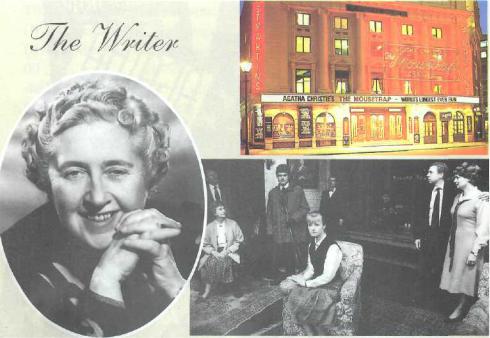
Reading
Work in three groups.
Group A Read about the writer.
Group B Read about the painter.
Group C Read about the musician.
Read your extract and answer the questions about your person. Try to guess the words underlined from the context. Then use your dictionary to check the words.
5What do you think were the most important events in her/his life?
6What do you learn of her/his works?
7When did she/he die?
Which of the following numbers or dates relate to your person? What do they refer to?
50 |
79 |
6,000 |
11 |
13 |
14 |
4,680,000 |
1882 |
1920 |
1926 |
1937 |
1952 |
|
|
1 Where was she/he born? |
When you have finished, find a partner from each of the |
|
2 |
When was she/he born? |
|
3 |
What do you learn about her/his childhood? |
other groups and go through the questions together. |
4 |
Which people played a part in her/his career? |
comparing information. |
|
|
In 1914, at the beginning of the |
|
|
war, she had married Archibald |
|
|
Christie but the marriage was |
|
|
35 unhappy. It didn't last and they |
|
|
divorced in 1926. That year there |
|
|
was a double tragedy in her life |
|
|
because her much-loved mother died. |
|
|
Agatha suffered a nervous breakdown, |
|
|
40 and one night she abandoned her car |
|
|
and mysteriously disappeared. She |
|
|
went missing for 11 days and was |
|
|
eventually found in a hotel in |
|
|
Harrogate, in the North of England. |
|
|
45 It is interesting to note that it was |
|
|
while she was suffering so much that |
|
|
she wrote one of her masterpieces, |
|
|
The Murder of Roger Ackroyd. |
|
|
Agatha desperately wanted solitude |
|
|
50 and developed very bitter feelings |
|
|
towards the media because the |
|
|
newspapers had given her a hard time |
Agatha Mary Clarissa Christie is |
• A scene from The Mousetrap, which |
over her breakdown and |
possibly the world's most famous |
opened in London on 25 November |
disappearance. She was determined |
detective story writer. She wrote 79 |
1952 and is still running today. |
55 never to let them enter her private life |
novels and several plays. Her sales |
|
again and she buried herself in her |
5 outnumber those of William |
|
work. On 25 November 1952 her |
Shakespeare. However, behind her |
During World War I, while she |
play The Mousetrap opened in |
4,680,000 words was a painfully shy |
20 was working in a hospital |
London. Today, over 40 years later, it |
woman whose life was often lonely |
dispensary, she learned about |
60 is still running. It is the longest |
and unhappy. |
chemicals and poisons, which |
running show in the whole world. |
io She was born in 1890 in Devon, |
proved very useful to her in her later |
She enjoyed a very happy second |
the third child of Clarissa and |
career. She wrote her first detective |
marriage to Max Mallowan, an |
Frederick Miller, and grew into a |
25 novel, The Mysterious Affair at |
archaeologist. Her detective skills |
beautiful and sensitive girl with |
Styles, in 1920. In it she introduced |
65 were a help to him in his excavations |
waist-length golden hair. She didn't |
Hercule Poirot, the Belgian detective |
in Syria and Iraq. By successfully |
15 go to school but was educated at |
who appeared in many subsequent |
staying out of the limelight she |
home by her mother. Her father died |
novels. Her other main detective |
ultimately found happiness with her |
when she was 11 and both she and |
30 was an elderly spinster called Miss |
beloved husband. She died peacefully |
her mother were grief-stricken. |
Marple. |
TO in 1976. |
30 Unit 3 Telling tales
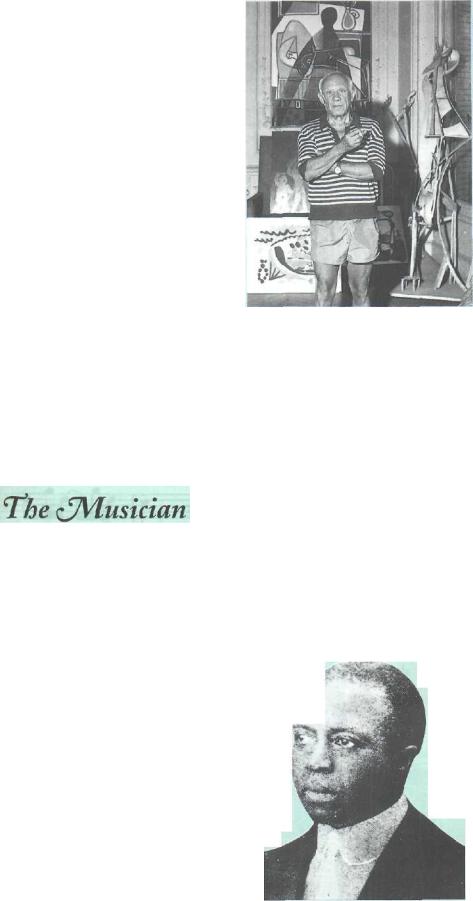
The Painter
On 25 October 1881 a little boy was born in Malaga, Spain, it was a difficult birth and to help him breathe, cigar smoke was blown into his nose! But despite
5 being the youngest ever smoker, this baby grew up to be one of the 20th century's greatest painters—Pablo Picasso.
Picasso showed his truly exceptional 30 talent from a very young age. His first
word was lapiz (Spanish for pencil) and he learned to draw before he could talk. He was the only son in the family and very good-looking, so he was thoroughly
is spoilt. He hated school and often refused to go unless his doting parents allowed him to take one of his father's pet pigeons with him!
Apart from pigeons, his great love was JO art, and when in 1891 his father, who was
an amateur artist, got a job as a drawing teacher at a college, Pablo went with him to the college. He often watched his father paint and sometimes was allowed
2; to help. One evening his father was painting a picture of their pigeons when he had to leave the room. He returned to
find that Pablo had completed the picture, and it was so amazingly beautiful and
30 lifelike that he gave his son his own palette and brushes and never painted again. Pablo was just 13.
From then onwards there was no stopping him. Many people realized that
35 he was a genius but he disappointed those who wanted him to become a
traditional painter. He was always breaking the rules of artistic tradition and shocked the public with his strange and
40 powerful pictures. He is probably best known for his 'Cubist' pictures, which used only simple geometric shapes. His paintings of people were often made up of triangles and squares with their
45 features in the wrong place. His work changed our ideas about art, and to millions of people modern art means the work of Picasso. Guernica, which he painted in 1937, records the bombing of
50 that little Basque town during the Spanish Civil War, and is undisputedly one of the masterpieces of modern painting.
Picasso created over 6,000 paintings, 55 drawings and sculptures. Today a
'Picasso' costs several million pounds. Once, when the French Minister of Culture was visiting Picasso, the artist accidentally spilt some paint on the
so Minister's trousers. Picasso apologized and wanted to pay for them to be cleaned, but the Minister said, 'Non! Please, Monsieur Picasso, just sign my trousers!'
65 Picasso died of heart failure during an attack of influenza in 1973.
Ever since it "was the musical theme in the film 'The Sting, there are few people who have not tapped their feet to the hit piano tune, 'The Entertainer'—the most famous composition of the American musician, Scott Joplin.
Scott was born in Texas in 1868, into a poor but musical black family. His father, who was a freed slave, played the violin, and his mother played the banjo and sang. Scott played the violin and bugle but his favourite instrument was his neighbour's piano. His father worked extra
hours to buy him a battered old grand piano, and soon Scott was playing by ear negro tunes, blues, and spirituals. Music flowed naturally from his fingers, and he quickly became the talk of the town.
Scott didn't learn to read music until he was 11, when an old German music teacher spotted his talent and gave him free, formal piano lessons. He learned to play the works of such composers as Bach, Beethoven, and Mozart as well as his improvised music. Thus when he started to
write music, his tunes were a
wonderful mixture of classical European
and African beat. This unique style was known as Ragtime, and was played everywhere in the USA in the early 1900s by
25 both black and white musicians.
In 1882, when Scott was 14, his mother died and he left home to seek his fortune in St. Louis. In the 1880s, St. Louis was noisy and bustling with life. The waterfront of the
Mississippi River was full of gangsters, gamblers, and
30sailors. The sound of music was everywhere—black, white and mixed. The hot steamy nights were
filled with blues, working songs, banjos, and honky tonk pianos. Scott was soon playing Ragtime piano in cheap bars on the waterfront.
35 This was a rough, tough area of the city where arguments over girls, whisky, and money were settled with fists and guns. Scott grew up very fast
and his musical talent continued to develop. AH in all he wrote about 50 piano rags.
40 Scott joplin died in 1917. Today he is the undisputed King of Ragtime, thanks to his natural ability, his unusual musical education, and the popularity of the film,
The Sting.
Telling tales Unit 3 31
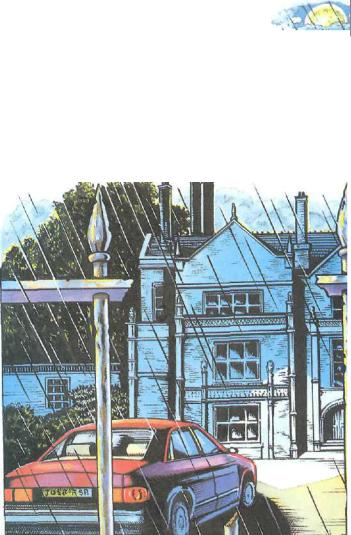
Comprehension check
1 Read the other two extracts quickly. Help each other with any new words, particularly those words which are underlined in your text.
2Here are some answers about all three people. Write in the questions.
a What |
|
? |
She was beautiful and shy, with long, golden hair.
b Why |
___ |
? |
|
|
|
|
|
To help him breathe, after a difficult birth.
c How |
_____ |
___? |
|||
|
|
|
|
|
|
By working extra hours. |
|
|
|||
d Why |
|
|
|
? |
|
Because they gave her a hard time over her breakdown and disappearance.
e |
When |
|
|
_____ |
? |
|||
|
|
|
|
|
|
|
|
|
|
In 1937. |
|
|
|
|
|
|
|
f |
Where |
______ |
|
|
___ ? |
|||
|
|
|
|
|
|
|
|
|
|
To St. Louis. |
|
|
|
|
|
|
|
Note-taking and discussion
Choose one of the most famous writers, painters or musicians in your country and write some notes about him/her. Discuss your notes with a partner.
-Is he/she alive or dead?
-What is/was he/she?
-What works do you know?
-Do you like his/her work? Why? Why not?
-What do you know about his/her life?
WRITING AND LISTENING
Adverbs in a narrative
Work in pairs.
1 Think about the worst holiday you ever had. Write some notes about it, then swap information with your partner.
2 Look at the top of page 33 and read about Jack and Liza's holiday. Put the words on the right into the correct place in each line, and make any necessary changes to the punctuation.
Language work
1 'The Mousetrap' was written by Agatha Christie.
In the sentence above, was written is an example of the Past Simple passive.
Find some more examples of this in the texts on pages 30 and 31, and put a box Q around them.
Grammar Reference: page 144.
2 |
Put the auxiliaries was, had, or didn't into the gaps. |
||||||||||||||||||||
a |
Agatha Christie |
|
|
|
|
educated at home. She |
|||||||||||||||
|
|
|
_ go to school. |
|
|
|
|||||||||||||||
b |
She . |
|
|
|
|
|
|
found in a hotel in Harrogate, after she |
|||||||||||||
|
|
|
|
|
been missing for 11 days. |
|
|
|
|||||||||||||
c |
She |
|
|
|
|
|
|
stop writing while she |
suffering |
||||||||||||
|
from a nervous breakdown. |
|
|
|
|||||||||||||||||
d |
Pablo Picasso |
|
|
|
|
|
|
|
like going to school unless he |
||||||||||||
|
___ |
|
|
|
allowed to take one of his father's pigeons |
||||||||||||||||
|
with him. |
|
|
|
|
|
|
|
|
|
|
|
|
|
|||||||
e |
His father |
|
|
___ |
|
paint again after Pablo |
|
|
|
||||||||||||
|
|
|
|
|
|
|
|
|
|
|
|
|
|||||||||
|
completed the picture of the pigeons. |
|
|
|
|||||||||||||||||
f |
Some paint |
|
|
|
|
|
|
spilt on the French minister's |
|||||||||||||
|
trousers when he |
|
|
|
|
|
visiting Picasso. |
|
|
|
|||||||||||
g |
Scott Joplin left home after his mother |
|
|
died. |
|||||||||||||||||
The
holiday
32 Unit 3 Telling tales
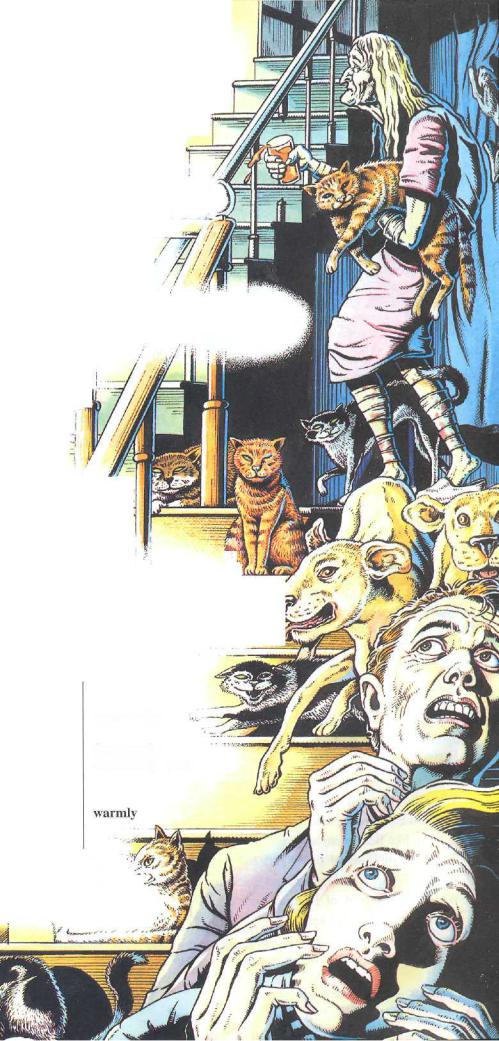
Just after Christmas two years ago, Jack and Liza decided to go away for New Year. They
didn't want to stay in a hotel with crowds of people and they were delighted when they saw an advertisement in the Sunday Times for a holiday flat in a village near Oxford.
suddenly somewhere
so really
It was no ordinary flat. It was on the top floor of an old TUdor mansion. They booked it and on New Year's Eve they set off in the car. It was raining and freezing cold. They were happy and excited.
However immediately Although heavily
They had been driving for three hours when |
nearly |
|
they saw the house in the distance. It looked |
finally |
|
magnificent with tall chimneys and a long, wide |
incredibly |
|
drive. They drove up to the huge front door, went |
|
|
up the steps, and knocked. Nothing happened. |
loudly |
|
They knocked again. The door opened and a |
more loudly Eventually slowly |
|
small, wild-looking, old lady stood there. |
|
|
3 T.23 Listen to Jack and Liza talking about what |
|
|
happened next and complete this part of the story.- |
|
|
The old lady was wearing ... |
|
|
She was carrying ... |
. ':; . |
|
The house was ... |
|
|
When she was leading them upstairs ... |
|
|
When they saw the rooms they couldn't believe their eye's'...
4 Read the end of the story. Put the words on the right into the correct place.
that wasn' t
When they got outside again the rain had turned to snow. They ran to the car, laughing. They
felt that they had been released from a prison and now they wanted to be with lots of people. They drove to the next village and as midnight was striking, they found a hotel with a room for the night. 'Happy New Year!' cried Jack, as he kissed the surprised receptionist on both cheeks. 'You "have no idea how beautiful your hotel is!'
hysterically
desperately fortunately just
Write the story of your worst holiday in about 250 words.
-When was it?
-Where was it?
-Who were you with?
-Why was it bad?
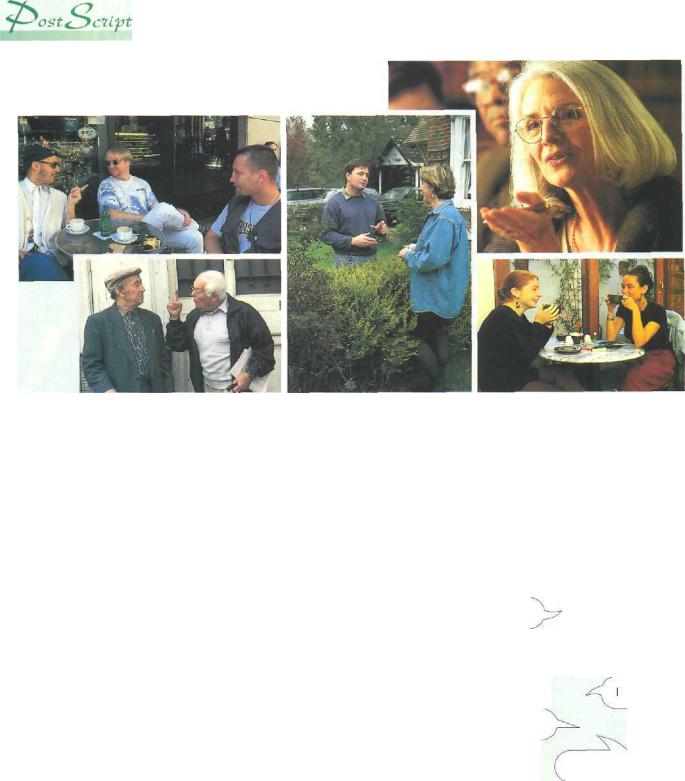
Giving opinions
1 What do the words in italics refer to in the sentences below?
aIt was so boring I fell asleep in the first act.
bI didn't like his last one, but I couldn't put his latest one down until the last chapter,
cIt was excellent. Have you seen it yet? It stars Anthony Hopkins and Emma Thompson.
dShe's usually very good but I don't think she was right for this part.
eI think they spoil them. They always give them whatever they want.
fIt was a good break, but the weather wasn't very good,
gThey were delicious. John had tomato and mozzarella
topping and I had ham and mozzarella.
hIt was really exciting, especially when Smith scored in the closing minutes.
2 T.24 The following questions are all asking for opinions. Match them with the opinions given in Exercise 1.
Did you like the film? D
What did you think of the play?
3 Write down some things you did, places you went to, and people you met last week.
Work with a partner and ask for and give opinions about them.
Example
Student A Student B
I went to Peter's party.
Oh! What was it like?
Great! I really enjoyed it.
met Maria's sister.
What did you think of her?
Did you enjoy your pizzas?
Do you like Ben Brown's novels?
What do you think of their children?
What was your holiday like?
What did you think of Hannah Smart?
What was the match like?
Listen and check your answers. Practise some of the questions and answers with a partner.
She's lovely. I liked her a lot.
34 Unit 3 Telling tales
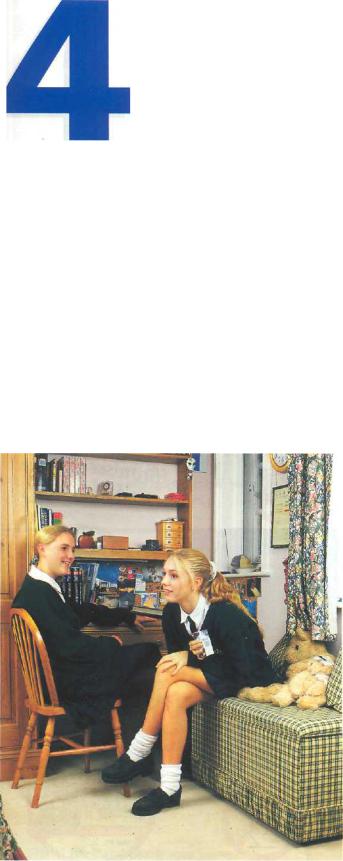
Doing the right thing
Modal verbs (1)
Requests and offers
Test your grammar
1 Look at the sentences. can
You |
must |
go. |
|
should |
|
|
have to |
|
2 Make the sentences negative. Make them into questions.
Make them into the third person singular [He/she ...).
Which verb is different?
PRESENTATION (1)
can, have to, and allowed to
1 The teenage years can be difficult for both parents and children! What sort of problems can there be?
2T.25 Listen to Megan and Laura, aged 14 and 15. What are some of the things they like and don't like about being a teenager?
3Complete the gaps.
a You |
|
|
go out to work. |
|||||
b You |
|
|
pay bills. |
|||||
c You |
|
|
go out with your friends. |
|||||
d I always |
|
|
|
___ tell my Mum and Dad |
||||
where I'm going. |
|
|
|
|
|
|||
e We |
|
|
|
do the housework. |
||||
|
|
|
|
buy what you want. |
||||
f You |
|
|
|
|
|
|||
|
|
|
|
|||||
g Adults |
|
|
|
|
|
worry about bills. |
||
h We |
|
|
wear a stupid school uniform. |
|||||
i We |
|
|
wear make-up. |
|||||
j We |
|
|
chew gum! |
|||||
Listen again and check. Practise saying the sentences.
4Laura's parents arc called Malcolm and Barbara. What are some of the things they have to do, and some of the things they don't have to do?
Examples
Barbara doesn't have to workfull-time.
Malcolm has to drive over a thousand miles a week.
Who do you think has an easier life, Barbara or
Malcolm?
-What about your family?
-Is there a division between what the men do and what the women do in your family?
Doing the right thing Unit 4 35
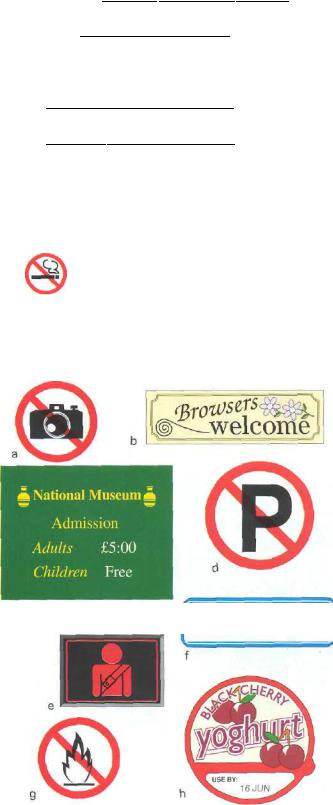
•Grammar questions
-Put have to or don't have to into the gaps.
Children |
|
|
go to school. |
||
Adults _ |
|
|
go to school, but they |
||
|
|
|
go to work. |
||
Old people |
_____________ |
go to work. |
|||
Teenagers |
________ |
|
study for exams. |
||
- Which sentence in each pair below is correct?
aYou don't have to drive on the right in Britain. You mustn't drive on the right in Britain.
bYou don't have to go to England to learn English. You mustn't go to England to learn English.
3 Make questions using have to or had to.
Example
We had to get up very early to catch the bus. What time did you have to get upl
a My mother has to go abroad a lot. |
|
|
How often __ |
. |
. |
bI have to leave tomorrow morning. What time
cWe had to wait for ages.
How long _____ |
|
. |
dI have to take my car to the garage. Why
ePeter had to stay in bed for a week. Why .
PRACTICE
1Grammar and speaking
1Put the sentences into the negative, the question, and the past.
Example
We can smoke. We can't smoke.
Can we smoke?
We couldsmoke.
aI have to go.
bShe has to work hard.
cHe can do what he likes.
d We're allowed to wear what we want.
2 Look at the chart. Make true sentences about you and your family.
I |
|
go out to work. |
My parents |
|
get up early in |
My father |
|
the morning. |
My mother |
has to |
do the shopping. |
My sister |
have to |
keep my room |
My brother |
doesn't have to |
tidy. |
My grandparents |
don't have to |
do the cooking. |
My husband/wife |
had to |
take the dog for |
My girlfriend/ |
didn't have to |
a walk. |
boyfriend |
|
do the washing. |
|
|
do the washing- |
|
|
up. |
Compare your sentences as a class.
Are/were your parents strict? Can/could you do what you want/wanted?
2 Signs
What do the following signs mean?
Examples
|
You can't smoke in here. |
|
You aren't allowed to smoke in here. |
PASSPORT |
You have to show yourpassport. |
CONTROL |
|
NO ^SKATEBOARDING*
36 Unit 4 Doing the right thing
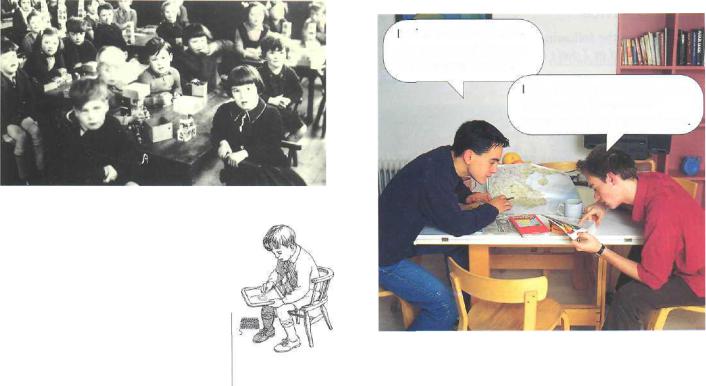
3 Listening and speaking
1 T.26 |
You will hear Bert Atkins, who was born in |
1919, talking about his school days. |
|
Check these words in your dictionary: |
|
to knit |
a cloth a slate chalk |
What does he say about the following?
knitting |
exams |
|
paper and pencils |
walking to school |
|
chalk and a slate |
a bike |
|
the 'Big Boys' |
leaving school |
writing lines |
school |
talking in class |
homework |
Listen again, and read the Tapescript on page 130 at the same time.
2Work in groups. Talk about your school rules.
-What aren't/weren't you allowed to do?
-What do/did you have to do?
-What punishments are/were there if you do/did something wrong?
PRESENTATION (2) must and should
1 T.27a |
Jim is going to backpack around the world for |
a year, but his mother is worried. Listen to them. |
|
Mum |
You must write to us every week! |
Jim |
Yes, Mum! I will. |
Mum |
You mustn't lose your passport! |
Jim |
No, Mum! I won't. |
Work in pairs. Make similar dialogues between Jim and his mother. Use the cues and must or mustn't.
look after your money |
talk to strangers |
go out when it's dark |
drink too much beer |
make sure you eat well |
have a bath regularly |
phone us if you're in |
go anywhere that's |
trouble |
dangerous |
T.27b Listen and check your answers.
2 T.28a Jim is going to travel with his friend, Anthony. Listen to them talking about their trip,
think we should take our travellers' cheques in American dollars,
don't think we should go to Thailand in September because it's the rainy season
Use / think... should or Idon't think ... shoutdtomake more suggestions. Take an idea in column A, and match it with a line in column B.
take plenty of suncream.
buy a book called See the World on $25 a Day. put too much in our backpacks.
take anything valuable. go to Australia first.
go to Indonesia by boat. wait too long before we go.
] We might lose it.
] I've got some friends there who'll put us up.
] I want to get started.
] It'll have some good ideas about where to go and where to stay.
] It'll be really hot.
J We won't be able to carry it all.
] It'll be cheaper than flying.
T.28b Listen and check your answers.
1 Grammar questions
You must look after your money. We should take travellers' cheques.
Which sentence expresses strong obligation? Which sentence expresses a suggestion?
Who is more forceful, Jim's mother or Anthony?
Doing the right thing Unit 4 37
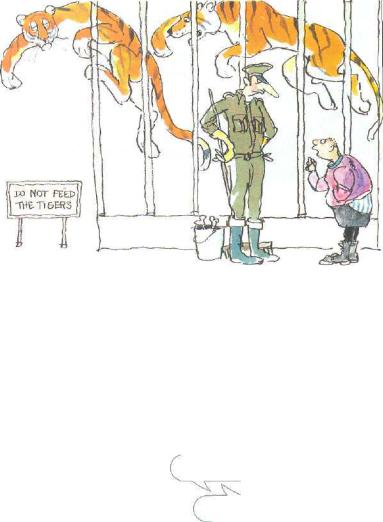
PRACTICE
1 Giving advice
Give advice in the following situations. Use
/ think should or / don't think ... should.
Example
Peter's got a very bad cold.
/ think he should go to bed.
I don't think he should go to work.
aI've lost my cheque book and credit cards.
bTony wants to drive home, but he's had too much to drink.
c(In a restaurant) Ugh! My soup's cold!
dI never have any money!
eJenny and Paul are only sixteen, but they say
they want to get married.
f I'm really fed up with my job.
Do you have any problems? Ask the class for advice!
2 must or have to?
Read the Language Review on page 39 before you do this exercise. Which sentence on the right goes with the sentence on the left?
Example
I must have a drink of water. I have to drink lots of water.
1 a I must do my homework tonight.
bI have to do my homework tonight.
2a We must go to Paris some time, b We have to go to Paris next
week.
The doctor told me to.
I'm really thirsty.
I'm telling myself that it's important.
This is why I can't come out with you. Sorry.
Another boring business trip. Yawn! It would be really nice!
3 |
a |
I must wear something nice to |
It's the rule. |
|
|
the disco. |
|
|
b |
Men have to wear a shirt and tie |
I want to look good. |
|
|
to go into a posh restaurant. |
|
4 |
a |
You must register for next term |
It says on the noticcboard. |
|
|
before Thursday, |
|
|
b |
You have to register for next |
One student is talking to another. |
|
|
term before Thursday. |
|
5 |
a |
I must water the plants today, |
I haven't done them for ages. |
|
b |
You have to water this plant |
It needs lots and lots of water. |
|
|
daily. |
|
3 Roleplay
Work in pairs.
Student A You are going to start a new job.
Student B You are a work colleague
Decide what the job is. Ask and answer questions about the responsibilities, hours, breaks, etc.
What time do I have to start? )
Do I have to wear a uniform?
No, but you should look smart.
When do we have a break?
4 Correcting mistakes
There is a grammar mistake in each of the following sentences. Find it and correct it!
aDo you can help me a minute?
bWhat time have you to start work?
cI must to go now. Bye-bye,
dWe no allowed to wear jeans at school.
eWe no can do what we want,
fI mustn't do the washing and ironing because my mother does it for me.
gYou can't smoking in here. It's against the rules,
hMy mother have to work very hard six days a week.
38 Unit 4 Doing the right thing
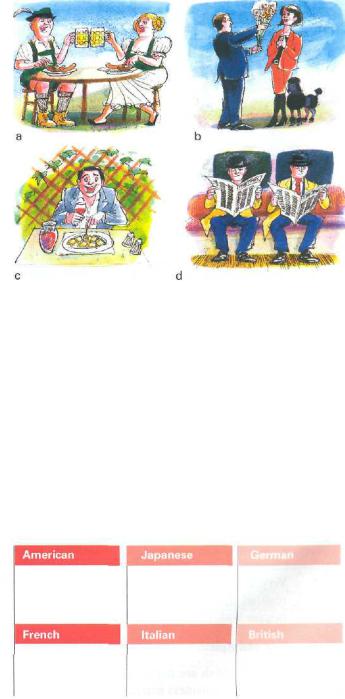
LANGUAGE REVIEW
Modals to express obligation
1 Must expresses a strong obligation.
All visitors must report to Reception. You mustn't steal things.' It's naughty.
2Have to expresses a general obligation based on a law or a rule.
Nurses have to wear a uniform.
Malcolm has to drive a thousand miles a week in hisjob.
3Sometimes must and have to are similar.
/must go now. Cheerio! I have to go now. Cheerio!
Sometimes there is a difference. Must is personal. We use must when we express our personal feelings, and say what we think is important or necessary.
You must work harder (I am telling you what to do.)
Imust wash my hair. It's dirty.
(I am telling myself that it's necessary.)
Have to is impersonal. It expresses a general obligation based on what another person tells us to do.
We have to wear a stupid uniform. (It's a school rule.) / have to take this medicine three times a day.
(The doctor said.)
4Have to is used to form the question, and the past and future.
Do you have to workfull-time?
I had to get up very early when I was at school
You'll have to work hard if you want to go to university.
5Should expresses what is right, or a good idea. It expresses advice, or a mild obligation.
You shouldget more exercise. Why don'tyouplay tennis?
You shouldn't eat so many sweets. They're badfor your teeth.
Negatives
Mustn't and don't have to express very different ideas.
You mustn't take drugs.
(This is a strong obligation not to do something.)
Teenagers don't have to go out to work.
(There is no obligation, but they can if they want.)
Modals to express permission
Can, can't, and be allowed to are used to express permission. Allowed to is passive.
We can't smoke or chew gum.
We aren't allowed to buy what we want.
P-J Grammar Reference: page 147.
READING AND SPEAKING
Pre-reading task
Work in pairs.
1 Look at the cartoons. What nationalities are the people? What makes it easy for you to identify them?
2What is the stereotype English man or woman? What do you think is the stereotype for your nationality? Do you believe in stereotypes?
3 Which adjectives in the box do you think go with the nationalities below?
Use your dictionary to check new words.
hard-working |
easy-going |
punctual |
friendly |
||
reserved |
emotional |
|
lazy |
outgoing |
|
hospitable |
sociable |
formal |
casual |
|
|
enthusiastic |
quiet |
tolerant |
talkative |
||
sophisticated well-dressed fun-loving respectful humorous serious nationalistic romantic
Is your nationality one of those above? If so. which adjectives did you choose?
If not, choose some adjectives which you think go with your nationality.
Doing the right thing Unit 4 39
